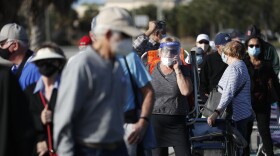
Joe Palca
Joe Palca is a science correspondent for NPR. Since joining NPR in 1992, Palca has covered a range of science topics — everything from biomedical research to astronomy. He is currently focused on the eponymous series, "Joe's Big Idea." Stories in the series explore the minds and motivations of scientists and inventors. Palca is also the founder of NPR Scicommers – A science communication collective.
Palca began his journalism career in television in 1982, working as a health producer for the CBS affiliate in Washington, DC. In 1986, he left television for a seven-year stint as a print journalist, first as the Washington news editor for Nature, and then as a senior correspondent for Science Magazine.
In October 2009, Palca took a six-month leave from NPR to become science writer in residence at The Huntington Library, Art Collections, and Botanical Gardens.
Palca has won numerous awards, including the National Academies Communications Award, the Science-in-Society Award of the National Association of Science Writers, the American Chemical Society's James T. Grady-James H. Stack Award for Interpreting Chemistry for the Public, the American Association for the Advancement of Science Journalism Prize, and the Victor Cohn Prize for Excellence in Medical Writing. In 2019, Palca was elected to the American Academy of Arts and Sciences for outstanding achievement in journalism.
With Flora Lichtman, Palca is the co-author of (Wiley, 2011).
He comes to journalism from a science background, having received a Ph.D. in psychology from the University of California at Santa Cruz, where he worked on human sleep physiology.
-
Johnson & Johnson reported on Wednesday that its COVID-19 vaccine appears safe. Clinical trial results are expected to be published later this month.
-
Even if the Biden administration releases all available doses of COVID-19 vaccines, supplies will remain limited. How best to use that limited supply is a question mathematicians can help answer.
-
Mathematical models can help public health officials decide how best to deploy the COVID-19 vaccine when it is in short supply.
-
Before scientists were even sure black holes existed, an Indian astrophysicist did the math behind Einstein's predictions of what would happen if two black holes collided.
-
A look at the week's COVID-19 and vaccine news, including new information from the variant out of the United Kingdom.
-
An FDA advisory panel has endorsed a second COVID-19 vaccine, the Moderna vaccine.The Food and Drug Administration will decide soon whether to grant emergency use authorization to the vaccine.
-
An advisory panel to the Food and Drug Administration met on Thursday to review Moderna's application for emergency use authorization for its COVID-19 vaccine. NPR discusses the latest.
-
The FDA released detailed analysis of the vaccine ahead of a Thursday meeting of a group of independent experts that will advise the agency on whether to authorize the vaccine for emergency use.
-
Americans are waiting for the first doses of Pfizer's coronavirus vaccine, expected to be distributed very soon. Moderna also has a vaccine waiting for federal review.
-
The Food and Drug Administration released its analysis of the Pfizer coronavirus vaccine. An independent committee will meet with the agency Thursday to discuss emergency use of the vaccine.


